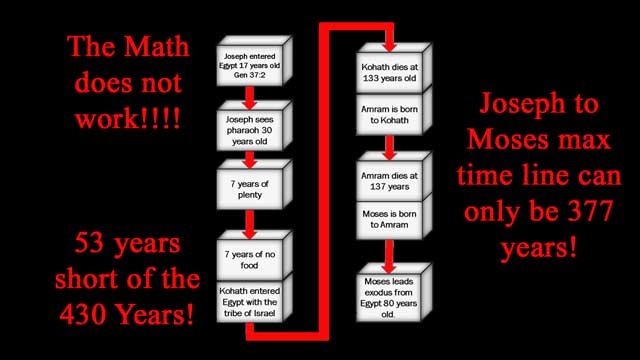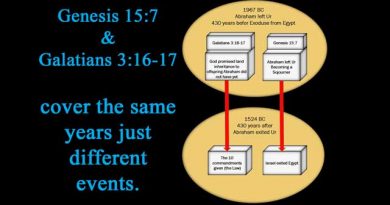Was Israel in Egypt for 430 Years?
The length of time that Israel spent in Egypt is unknown. The Bible does not give us an exact number of years that Israel lived in Egypt. However, three popular views address this unknown length of years. The first popular view uses genealogy to place Israel in Egypt for about 200 years. The other views use 430 years and 400 years as set lengths of times.
Genealogy gives us insight into the time Israel lived in Egypt. The Bible names two individuals that lived in Egypt. The two individuals are Joseph and Moses. The Bible gives us exactly how long both these individuals lived. Joseph’s lifespan is covered in two verses. Genesis 37:1 tells us that Joseph was about 17 years old when he was sold into slavery. The second verse of Genesis 50:22 informs us that Joseph was 110 years old when he died. By subtracting 17 from 110 years, Joseph lived in Egypt for 93 years. The second individual is found in Exodus 7:7. Moses was 80 years old at the time of the Exodus. These two numbers, 93 and 80, are the only known lengths of time that happened sequentially but simultaneously with Israel’s stay in Egypt.
The only time missing is that from the death of Joseph to the birth of Moses. After Joseph died, a new king that did not know Joseph ruled over Egypt. While there could have been several Pharaohs before this new Pharaoh, the Bible does not say this was the case. Adding more Pharaohs into the timeline would be based more on emotion than facts. The Bible informs us that when the Pharaoh that knew Joseph passed away, a new one arose. The new Pharaoh made a decree that every Israelite newborn male must be cast into the river. The decree marks Moses’ birth, as we are told Moses was floated down the river at that time. Then, 80 years after Moses was born, Moses led Israel out of Egypt. The 93 years of Joseph and 80 years of Moses add up to 173 years.
Joseph’s death to Moses’ birth is the key to determining Israel’s total time in Egypt. If only one Pharaoh came to power, then the lapse in time could be as little as two years. If many generations of Pharaohs passed, then up to 257 years could have passed.
The primary motivation for 257 years to be added between Joseph and Moses is to make Israel’s time in Egypt 430 years in order to match Exodus 12:40, which says, “Now the time that the children of Israel dwelt in Egypt was four hundred and thirty years. And it came to pass at the end of four hundred and thirty years.” Reading this verse leaves us with the impression that Israel was in Egypt for 430 years.
The statement “in Egypt 430 years” comes from the Masoretic translation of the Old Testament that the early church did not use. The Roman Catholic and subsequently the Protestant Bibles relied on the Masoretic text as our Old Testament source. The Masoretic translation was compiled between AD 200 and AD 900. The Masoretic translation was translated from the Quattuordecim, Ezra’s direct translation used by both the Jews and the early church. Jesus and His apostles did not use the Masoretic translation, because it was not made until several hundred years later.
A second Bible translation of the Old Testament is the Septuagint. The Septuagint is based on the Greek translation made from the Quattuordecim. The Septuagint is a Greek translation of the old Hebrew Quattuordecim. The Septuagint is over 200 years older than Jesus and His apostles, making this the oldest translation of the Hebrew text known to exist. The Septuagint was the direct translation of the Old Testament for the early Christians and apostles and predated the completed Masoretic by about 1,000 years.
The Masoretic and Septuagint are both translations of the Quattuordecim. This is similar to the comparison between the King James and the American Standard Version, both being translated from the Masoretic Hebrew, and they both have translation errors. The same goes for the Masoretic and Septuagint; they are both translated from the Quattuordecim, and they both may have translation errors.
Richard Ottley, in A Handbook to the Septuagint, states this about the Septuagint:
The oldest translation of the Hebrew Scriptures; older than the New Testament, and written in the same language. Very naturally, therefore, the Old and New Testament in Greek came together to form the Bible of the early Christian church. For five centuries or so this version of the Old Testament was dominant; translations into other languages were, as a rule, made from it, and not from the Hebrew, until the Vulgate appeared.[1]
The early Christians predominantly used the Septuagint as it was the dominant language at the time. No early Christians used the Masoretic, since it was not even translated 200 to 900 years after Jesus. The Hebrew Masoretic and Greek Septuagint translations are both translated from the Quattuordecim, and they both may have translation errors.
The Septuagint for Exodus 12:40 states, “The sojourning of the children of Israel, while they sojourned in the land of Egypt and the land of Canaan, was 430 years.”
The Septuagint combines the years Israel spent in Canaan and Egypt. To this same effect, Josephus said, “They left Egypt in the month Xanthicus, on the fifteenth day of the lunar month; four hundred and thirty years after our forefather Abraham came into Canaan, but two hundred and fifteen years only after Jacob removed into Egypt.”[2]
Both the Septuagint and Josephus tell us the 430 years were not just in Egypt but a combination of time spent in both Canaan and Egypt.
Comparing the 430 years to the genealogy of Moses will give us further clarity. Moses’ genealogy consists of Israel’s genealogy and a portion about Moses’ immediate family. Moses wrote Israel’s genealogy, and his personal family’s genealogy then made the statement of the 430 years. Since Moses wrote his genealogy and the 430 years statement, they should fit together without contradiction.
To assist with evaluating whether or not the 430 years in Egypt is possible, let us evaluate Moses’ family tree from the time Israel was in Egypt. The best start date for Joseph is when he was sold into slavery. Starting with Joseph’s arrival, let us then add on every individual’s entire life (birth to death) from Moses’ family line that lived in Egypt. The whole years from birth to death will be used because the Bible does not provide the father’s age when each son was born. This will give the maximum amount of time that will encapsulate the actual total years in Egypt.
The first step is to calculate the time that Joseph spent in Egypt alone.
Genesis 37:2 tells us that Joseph was sold into slavery at 17 years of age. Genesis 42:46 informs us that Joseph was 30 years old at the start of seven years of plenty prophesied in a dream to Pharaoh (Genesis 41:53). The seven years of famine begin in Genesis 41:54. Thus Joseph lived 27 years in Egypt before his family came. We will add this number to the years that encompass Moses’ family tree since the move to Egypt by Israel. This is done with an emphasis on finding the maximum amount of time possible that Israel might have been in Egypt.
Now, let us focus on Moses’ timeline.
The Bible does not indicate what age Kohath (son of Levi, son of Israel) was when he came to Egypt. To error on the side of caution, we will use his entire lifespan of 133 years as if he was born during the move to Egypt (Exodus 6:18). Kohath had a son named Amram who lived 137 years (Genesis 6:20). Amram had a son named Moses (Exodus 6:20). If one supposed that both Amram and Moses were born in the same year that their fathers died, one could add up all the years of all their lives to find the maximum amount of time they spent in Egypt. Doing this gives only (133+137) 270 years. Adding Moses’ time of 80 years when Israel left Egypt (Exodus 7:7) gives us (270+80) 350 years. Finally, adding Joseph’s time in Egypt to Moses’ family line gives us a maximum number of years of (27+350) 377 from Joseph to Moses. The total years that Israel could have been in Egypt is 377 years max.
The 377 years is less than the 430 years by 53 years—and that is assuming the greatest possible years between the genealogies possible, which is clearly overstated. This means it is physically impossible for Israel to have been in Egypt for 430 years.
[1] Richard R. Ottley, A Handbook to the Septuagint (London: Methuen, 1920), p. VII.
[2] Josephus, Translated by Whiston, The Works of Flavius Josephus: Antiquities of the Jews (London: John Bumpus, 1828), 2.15.2, p. 75.




